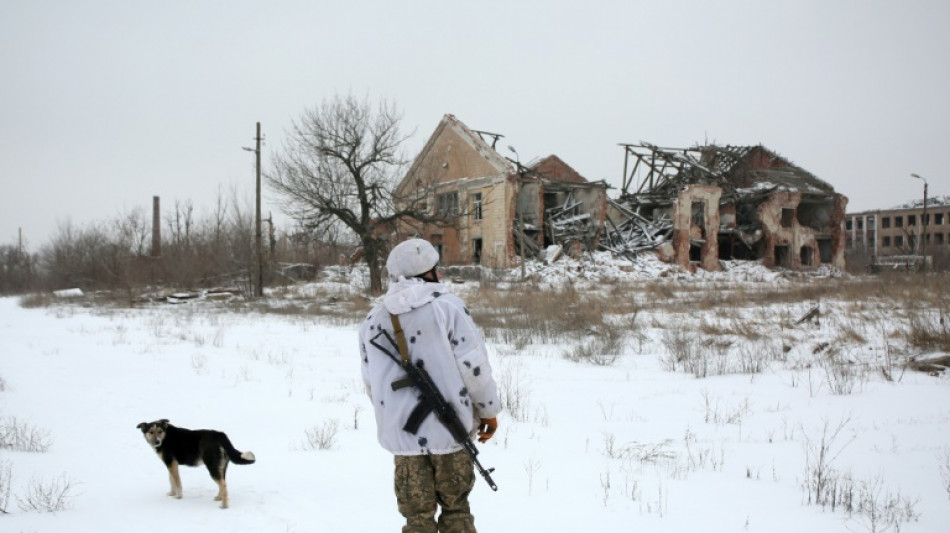

US, Germany step up pipeline warnings if Russia invades Ukraine
The United States and Germany on Thursday warned Russia that a major gas pipeline was at stake if it invades Ukraine as Washington voiced hope for a diplomatic way out despite frigid statements from Moscow.
A day after the United States and its allies formally responded to security demands issued by Russia, top officials in Moscow said their chief concerns were not addressed but notably did not rule out new talks.
The United States has warned Russia of swift and severe consequences if it invades Ukraine after Moscow amassed tens of thousands of troops on the border with its Western-leaning neighbor.
Following worries in the West about divisions within Europe, German Foreign Minister Annalena Baerbock told parliament that her government was "working on a strong package of sanctions" alongside allies that would include Nord Stream 2.
The pipeline, which Germany has defiantly built despite criticism by the United States and Eastern Europeans, will more than double supplies of Russian natural gas to Europe's largest economy.
In Washington, a top official voiced confidence that an invasion would stop Germany from activating the multibillion-dollar project, which was completed in September but still requires testing and regulatory approval.
"If Russia invades Ukraine, one way or another, Nord Stream 2 will not move forward," said Victoria Nuland, the under secretary of state for political affairs.
"I think the statements coming out of Berlin even today are very, very strong," she told reporters.
The White House also announced that Germany's new chancellor, Olaf Scholz, will visit on February 7 to discuss Russia's "aggression against Ukraine" with President Joe Biden.
Biden also spoke Thursday by telephone with Volodymyr Zelensky, whose government a day earlier engaged in marathon talks in Paris with Russia in a separate bid to decrease tensions.
Zelensky tweeted afterward that he and Biden discussed efforts at de-escalation and joint actions for the future, as well as potential US financial support for Ukraine following hundreds of millions of dollars of military aid.
NATO has put 8,500 troops on standby over the Ukraine crisis, in scenes reminiscent of the Cold War with the Soviet Union.
- 'Only one decider' -
Russia denies any plans to invade but last month demanded wide-ranging security guarantees from the West, including that Ukraine never be allowed to join the US-led NATO military alliance.
Washington on Wednesday delivered a reply in coordination with NATO allies, saying that Ukraine had the right to determine its own allies but offering Russia talks on missile placements and other mutual concerns.
In its first reaction to the reply, the Kremlin was unimpressed but cautious.
"It cannot be said that our views were taken into account," President Vladimir Putin's spokesman Dmitry Peskov told reporters.
"Let's not rush into assessments; it takes time to analyze," he said.
Russian Foreign Minister Sergei Lavrov said Moscow's chief concern -- the potential for Ukraine to join NATO -- had been ignored, but that it would be possible to move forward on other issues.
"There is a response which gives hope for the start of a serious conversation on secondary questions," Lavrov said.
Nuland quipped that the most important takeaway from the Russian response was that Putin had the documents.
"There's only one decider in Moscow and that is President Putin," Nuland said.
"We hope he will see here a real opportunity for a legacy of security and arms control rather than a legacy of war," she said.
"The ball is in their court."
- 'Ukraine in the middle' -
On the streets of Kyiv, there were concerns that Ukraine had been forgotten amid the high-level talks between Moscow, NATO and Washington.
"The United States is provoking Russia and Russia is provoking the United States. And somewhere in the middle is Ukraine," said Dmytro Sylenko, a 23-year-old businessman.
"Honestly, I don't care who is provoking whom, what matters to me is that there is peace. I don't care about the rest," he told AFP.
Russia, which has a fraught historical relationship with Ukraine, has fuelled an insurgency in the former Soviet republic's east that has killed more than 13,000 people since 2014.
That year Russia also seized Crimea after the overthrow of a pro-Russian government in Kyiv.
In the separate bid to defuse tensions, senior Russian and Ukrainian officials agreed to meet again in two weeks in Berlin after eight hours of talks in Paris on Wednesday.
Zelensky's office in a statement praised the "constructive nature" of the meeting and the agreement to meet again.
France said after the so-called Normandy Format talks that the envoys committed to a fragile July 2020 ceasefire in eastern Ukraine between government forces and pro-Moscow separatists.
Adding to tensions, a 21-year-old Ukrainian national guard conscript opened fire at an aerospace factory on Thursday, killing five people, although there was no indication of a link to the standoff with Russia.
burs-sct/ec
R.Marconi--IM




